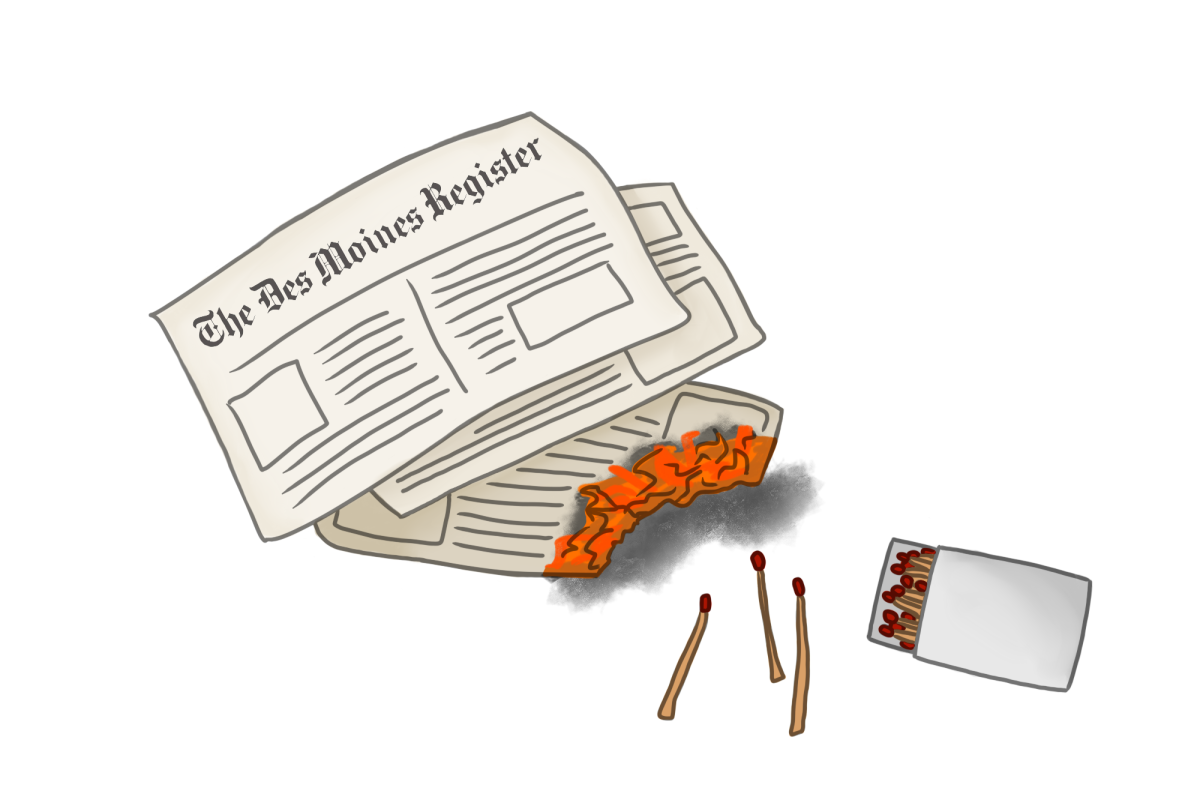Journalism has long been the beating heart of American democracy. As one of the five crucial freedoms outlined in the First Amendment of the Constitution, the free press has reported the facts, encouraged political awareness and held those in power accountable for their actions throughout our nation’s history. But in today’s political climate, journalism is at risk, and much of this risk comes from the single most powerful person in our country. President Donald Trump is after us, and it’s time to take a stand.
On Dec. 13, 2024, ABC News made the surprising decision to settle a defamation lawsuit with Trump. Trump’s legal team filed the case in response to an on-air section of ABC’s This Week show in which news anchor George Stephanopoulos repeatedly suggested that Trump had been found civilly liable for the rape of writer E. Jean Carroll. The president was in fact found liable for sexual abuse and defamation, a ruling heavily influenced by New York’s strict legal definition of rape.
The settlement, which established a $15 million “charitable contribution” to Trump’s presidential library and afforded Trump an additional one million dollars to cover his legal fees, came as a shock to law and media experts alike.
This was far from the first time Trump filed suit against a news outlet—in fact, he had already lost lawsuits against CNN, The New York Times and The Washington Post—but this case marked a stunning change in outcome.
“Major news organizations have often been very leery of settlements in defamation suits brought by public officials and public figures, both because they fear the dangerous pattern of doing so and because they have the full weight of the First Amendment on their side,” said RonNell Andersen Jones, a professor of law at the University of Utah, in a New York Times article.
Andersen Jones and her fellow media law experts warned that this decision would embolden Trump in his war on the press. It took only three days for these predictions to prove true.
Seemingly caught up in the euphoria of their recent victory, Trump and his legal team filed a lawsuit against The Des Moines Register, its parent company Gannett and pollster J. Ann Selzer in Iowa’s Polk County Court on Dec. 16. This suit was based upon the accusation that Selzer, the newspaper’s now-retired head pollster, had published falsified polling results showing Harris winning the state of Iowa in order to sway the results of the November presidential election. Although the poll proved an inaccurate indicator of final election results, the newspaper stands by their reporting and has published a detailed report outlining their polling methods.
While the case against The Des Moines Register fits into an alarming pattern, it also represents a crucial departure from Trump’s prior media lawsuits: it is filed under the Iowa Consumer Fraud Act rather than defamation law.
“It’s clear that Trump is waging war on the press,” said Samantha Barbas, a professor at the University of Iowa College of Law, in a different New York Times article about the lawsuit against The Des Moines Register. “Trump and his lawyers are going to use any legal claim that they think has a chance of sticking. They’ll cast a wide net to carry out this vendetta.”
Another key difference is the publication against which Trump has focused his legal power. ABC News has over 7 million daily viewers. CBS News, which is reportedly in settlement talks with Trump over accusations of “deceptively editing” an interview with Kamala Harris, has a viewership of nearly 5 million. The Des Moines Register, on the other hand, has a daily circulation of around 30,000.
Trump is no longer just targeting the media giants. He is after local news. The president is a man concerned with his image, and if a publication seeks to sully that image, he wants the publication gone. He doesn’t care that the readership of The Des Moines Register rarely strays beyond the boundaries of Iowa. He doesn’t care that predicting election results is an inexact science. He doesn’t care that news is essential to a functioning democracy. Trump simply doesn’t care, and this realization is terrifying.
It is time for America to realize that journalism, regardless of the location, budget or format, is worth protecting. When James Madison penned the First Amendment of the Constitution, he included press freedom for a reason. Our founding fathers recognized that journalism, like free speech, is something our country should fight for.
In this respect, modern-day Americans have lost their way. According to a survey conducted by Gallup, trust in the media has hit an all time low. In 2024, 36% of Americans reported having no trust in the media. Compared with eight percent in 1974, this statistic is frightening. So what has happened in those 50 years? Why do citizens no longer trust journalism? The answer is political extremism.
In recent years, politics have grown more divisive. Partisan divisions have deepened, and common ground has shrunk significantly. Campaigns are not based on facts: they appeal to emotion, spurring anger and generating fear. Americans have been taught that if the media doesn’t support their world view or political beliefs, it is to be regarded as “fake news.” Our country is caught in an echo chamber where confirmation bias runs rampant and mistrust is not just amplified but encouraged.
Journalism is not without its faults, but the vast majority of journalists are not driven by an agenda—they are propelled by a desire to uncover the truth. Trump’s tirade against the press has incited fear in the journalism industry. In a December press conference, Trump announced his plan to “straighten out the press.” But the press doesn’t need straightening. Trump is not advocating to increase fact-based coverage: he hopes to scare news publications into submission.
We cannot live in a country where members of the media are afraid to perform their role in democracy to the fullest extent. If journalists tiptoe around controversial issues and tone down negative coverage of those in power, the First Amendment has failed.
There is no democracy without journalism. If the freedom of the press is restricted, so is the freedom of the people. Since our country’s inception, it has been the responsibility of journalists to hold leaders accountable for their actions. With the press at risk, we as citizens must now assume this role. There are so many ways to do so. Read the newspaper. Donate to organizations such as the Committee to Protect Journalists or the Freedom of the Press Foundation. Educate friends and family on the importance of press freedom.
Now more than ever, it is imperative to support journalists and local publications, whether it be financially or just in spirit. The free press is fundamental, and we must not allow a single powerful man to burn it to the ground.
































